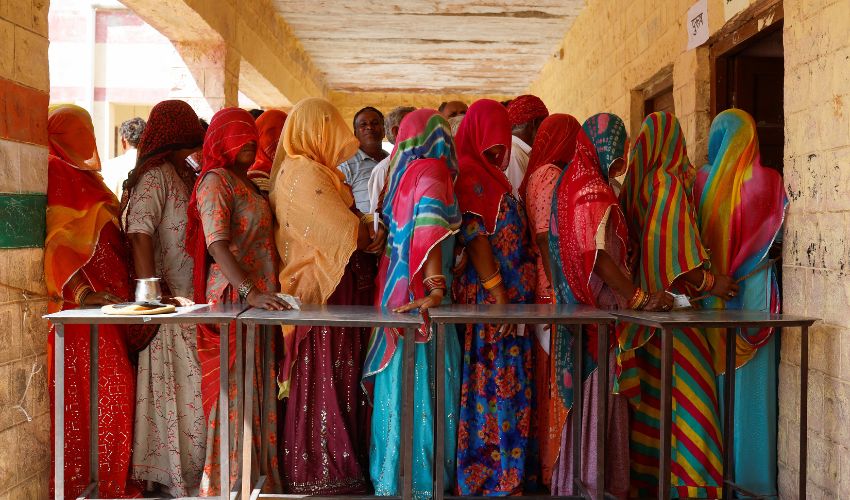In the fifth phase of India's massive general elections, thousands of voters turned out early on Monday to avoid the intense heat in the country's financial hub, Mumbai, as well as the vast states of Uttar Pradesh and Odisha.
The world's biggest election got underway on April 19 in the midst of scorching summer temperatures; the weather service was forecasting more days with heatwaves than normal for the duration of the season.
On June 4, votes will be tallied, and it is anticipated that Prime Minister Narendra Modi will secure an uncommon third term in office.
Sangeeta Rege, 46, a director at a health research organization, said, "There could have been fans and better arrangements for the ill and those with disabilities given the hot and humid conditions."
She was speaking in response to the collapse of two elderly people at her polling place in Mumbai, where high temperatures—33 degrees Celsius (91.4 Fahrenheit) and 71% humidity—made it difficult for many people, particularly the elderly, to go outside.
There are almost a billion voters in India, but more people used their right to vote after the early rounds' low turnout, raising the average of the first four rounds to 66.95%, with 69% of voters casting ballots in the fourth phase on May 13.
The least number of constituencies are expected to cast ballots on Monday, when 89.5 million people are expected to choose representatives for 49 seats.
Prominent contenders contesting on Monday comprise Defence Minister Rajnath Singh from Lucknow and Trade Minister Piyush Goyal, who is running from one of Mumbai's six seats. Both cities have had low voter turnout in the past.
Residents of both cities were specifically urged by the Election Commission on Sunday "to erase the stigma" of urban apathy.
"Better infrastructure and more 'ease of living' is at the core of our vision for Mumbai," Prime Minister Narendra Modi declared last week during a campaign stop in the city.
In the huge and politically significant northern state of Uttar Pradesh, two boroughs belonging to the Nehru-Gandhi dynasty of the opposition Congress party are also voting.
In addition to the already-voted-in southern seat of Wayanad, family scion Rahul Gandhi is running for the seat of Raebareli.
The minister for women's and children's development, Smriti Irani, is running from Amethi, where she defeated Rahul Gandhi in 2019 to occupy the seat that his family has held for the previous forty years or more.
A former wrestling federation chief's son is running for office in Kaiserganj, one of the state's other highly anticipated contests, despite the father's allegations of sexually abusing female wrestlers.
The ruling Bharatiya Janata Party (BJP) was initially concerned about low voter turnout, and observers think this raised questions about the party's and its allies' hopes for a landslide victory.
In the eastern state of Odisha, however, long lines outgrew polling places in Mumbai and Bolangir when the weather department predicted that the maximum temperature would rise by two to four degrees Celsius.
Homemaker Jaya Roy Chowdhury, 48, of Mumbai stated that she was running for office "to ensure stability and security... plus development of my city and country which... is happening at a rapid rate."
Girish Mishra, an Odisha farmer, 55, said of the lower house of parliament, "We are voting... with Modi in mind, but the BJP has not fielded the right candidate for the Lok Sabha."
In response to accusations from opponents that he is courting hardline voters by singling out Muslims of color, Modi declared in a post-phase television interview that he would "not do Hindu-Muslim (in politics)".
He has frequently claimed—a charge the opposition party has refuted—that the Congress is preparing to give welfare benefits to Muslims at the expense of underprivileged tribal groups and Hindu castes.



























